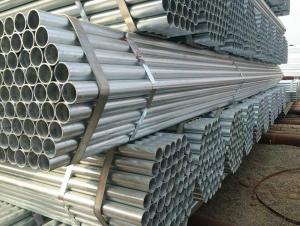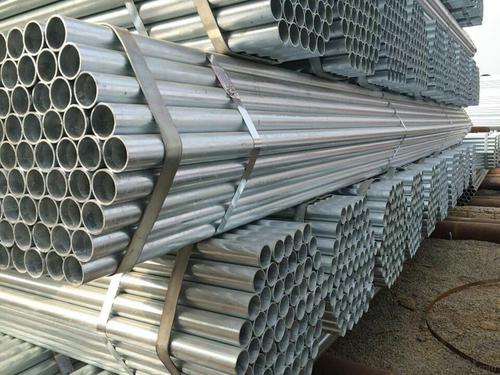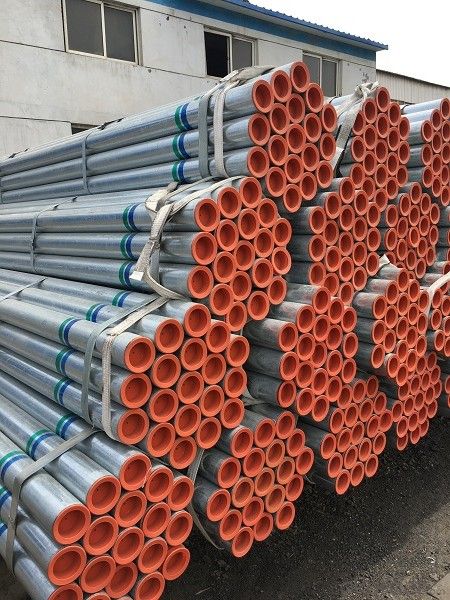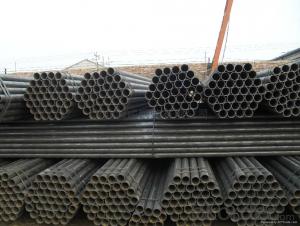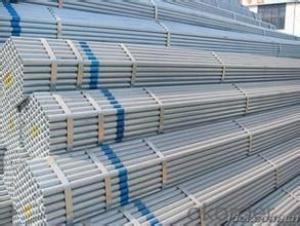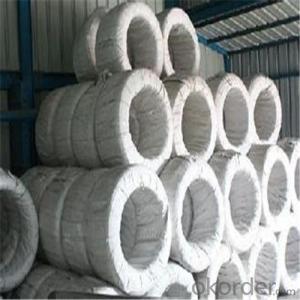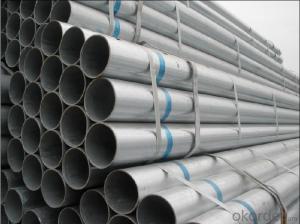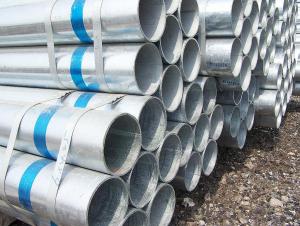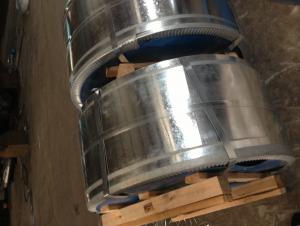Hot dip galvanized welded steel pipe for petroleum machinery
- Loading Port:
- Tianjin
- Payment Terms:
- TT OR LC
- Min Order Qty:
- 30 m.t.
- Supply Capability:
- 15000 m.t./month
OKorder Service Pledge
OKorder Financial Service
You Might Also Like
Specification
1、 Hot dip galvanized welded steel pipe for petroleum machinery:
The surface of galvanized steel pipe welded steel pipe of hot dip galvanized layer or. Galvanized can increase the corrosion resistance of the steel tube, prolong service life. Galvanized pipe is widely used, in addition to water, gas, oil and other general low pressure fluid pipelines. It is also used in the petroleum industry, especially for offshore oil field of oil well pipe and oil pipe, chemical, coking equipment of oil heater, condensation cooler, coal run oil exchanger tube, and trestle pile, the mine tunnel support frame tube.
2、Main Features of Hot dip galvanized welded steel pipe for petroleum machinery:
• High manufacturing accuracy
• High strength
• Good visual effect
• Reasonable price
3、 Hot dip galvanized welded steel pipe for petroleum machinery Specification:
Standard | GB, DIN, ASTM ASTM A106-2006, ASTM A53-2007 |
Grade | 10#-45#, 16Mn 10#, 20#, 45#, 16Mn |
Thickness | 1 - 33 mm |
Section Shape | Round |
Outer Diameter | 21 - 610mm |
Place of Origin | Tianjin, China (Mainland) |
Secondary Or Not | Non-secondary |
Application | Hydraulic Pipe |
Technique | Cold Drawn |
Certification | API |
Surface Treatment | factory state or painted black |
Special Pipe | API Pipe |
Alloy Or Not | Non-alloy |
Length | 5-12M |
Outer Diameter | 21.3-610mm |
Grade | 20#, 45#, Q345, API J55, API K55, API L80, API N80, API P110, A53B |
Standard | ASME, ASTM |
1) Material:Q195 Q235 Q345 X42 X52
2) Specification range:OD:21.3-610mm,WT:6-70mm,length:6-12m or according to the requirement of clients.
3) Excutive standards:GB,ASME API5L.ASTM A 106/A53,Despite of the above standards,we can also supply seamless steel pipe with standard of DIN,JIS,and so on,and also develop new products according to the requirements of our clients!
4) Surface: galvanized.
5) Ends:Beveled or square cut,plastic capped,painted.
6) Packing:bundles wrapped with strong steel strip,seaworthy packing.
4、Packaging & Delivery
Packaging Details: | seaworthy package,bundles wrapped with strong steel strip |
Delivery Detail: | 15-30days after received 30%TT |
5、FAQ of Hot dip galvanized welded steel pipe for petroleum machinery:
①How is the quality of your products?
Our products are manufactured strictly according to national and internaional standard, and we take a test
on every pipe before delivered out. If you want see our quality certifications and all kinds of testing report, please just ask us for it.
Guaranteed: If products’ quality don’t accord to discription as we give or the promise before you place order, we promise 100% refund.
②How about price?
Yes, we are factory and be able to give you lowest price below market one, and we have a policy that “ for saving time and absolutely honest business attitude, we quote as lowest as possible for any customer, and discount can be given according to quantity”,if you like bargain and factory price is not low enough as you think, just don’t waste your time.Please trust the quotation we would give you, it is professional one.
③Why should you chose us?
Chose happens because of quality, then price, We can give you both.Additionally, we can also offer professional products inquiry, products knowledge train(for agents), smooth goods delivery, exellent customer solution proposals.Our service formula: good quality+good price+good service=customer’s trust
SGS test is available, customer inspection before shipping is welcome, third party inspection is no problem.
6、 Hot dip galvanized welded steel pipe for petroleum machinery Images:
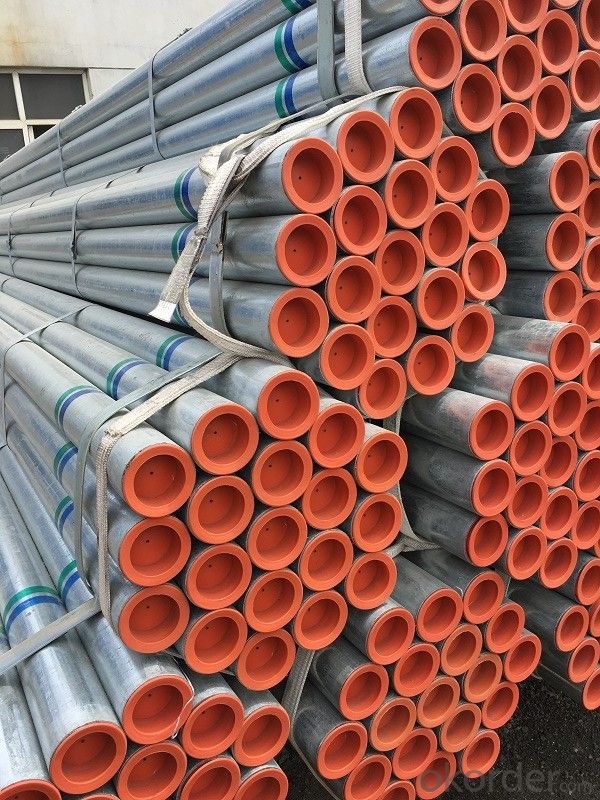
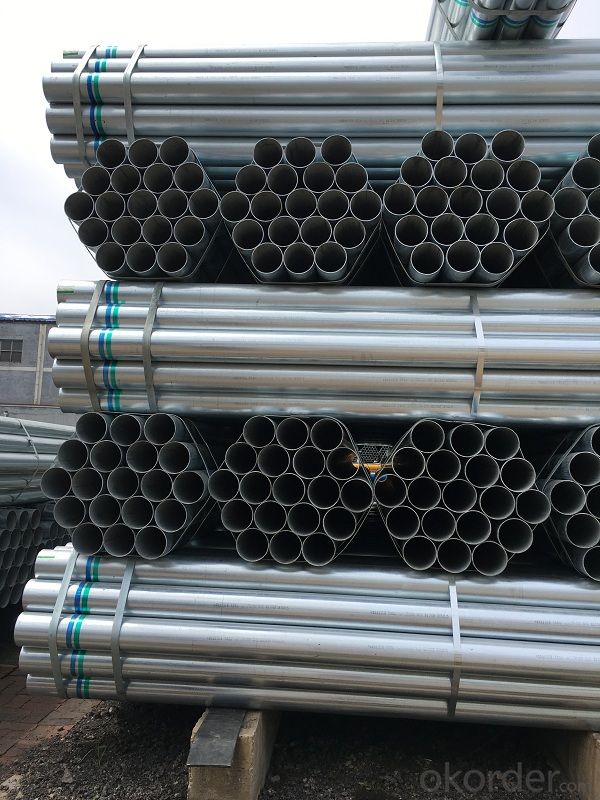
- Q: How do you calculate the bending moment of a steel pipe?
- The bending moment of a steel pipe can be calculated using the formula M = F * d, where M is the bending moment, F is the applied force, and d is the distance from the neutral axis to the point where the bending moment is being calculated.
- Q: A333gr6 steel pipe and domestic material of the same?
- A333Gr.6 steel is no nickel steel is a kind of fine grain aluminum low temperature toughness of steel, therefore, also called Al killed steel. A333Gr.6 belongs to the United States ANSI and ASTM-SA333 cryogenic steel standards and is used at the lowest impact temperature of -46 degrees celsius. Its temperature, range of use and fracture toughness value are similar to those of domestic 16Mn steel (the minimum usage temperature of 16Mn steel is -40 degrees Celsius).
- Q: What are steel pipes?
- Steel pipes are cylindrical tubes made from steel that are used for various purposes, such as transporting fluids and gases, structural applications, and construction projects. They are known for their durability, strength, and resistance to corrosion, making them a popular choice in industries such as oil and gas, plumbing, and infrastructure development.
- Q: What are the main types of steel pipe ah? How to judge which kind of steel pipe performance is better?
- Welded steel pipe for different welding process and divided into the furnace pipe welding (ERW) pipe and automatic arc welding, because of the different forms of welding seam welded pipe and spiral welded pipe is divided into two kinds, end its shape is divided into circular welded and shaped (square, flat) pipe.The welded pipe is rolled into the steel tubular to sew or spiral seam welded in the manufacturing method, and is divided into low pressure fluid delivery with welded steel pipe, spiral welded steel pipe, welded steel pipe, welded pipe roll etc.. Seamless steel pipe can be used in various industries, such as liquid, pneumatic, pipeline and gas pipeline. Welding pipes can be used in water pipelines, gas pipelines, heating pipes, electrical appliances, pipelines and so on.Press materialSteel pipe according to the pipe material (ie steel) can be divided into: carbon tube and alloy tube, stainless steel tube.Carbon tube can be divided into ordinary carbon steel tube and high quality carbon structure tube.The alloy tube can be divided into: low alloy pipe, alloy pipe structure, high alloy tube, high strength tube. Bearing tube, heat resistant acid resistant stainless pipe, precision alloy (such as cutting alloy) pipe, high temperature alloy tube, etc..
- Q: How are steel pipes measured and categorized?
- Steel pipes are typically measured and categorized based on their outer diameter (OD) and wall thickness. The OD is measured in inches or millimeters, while the wall thickness is measured in inches or centimeters. Pipes are further categorized based on their schedule, which refers to the wall thickness and determines the pressure rating of the pipe. The schedule is denoted by a letter or number, such as Schedule 40 or Sch 80. These measurements and categorizations help in selecting the appropriate steel pipe for different applications and ensure compatibility with fittings and other components.
- Q: What are the main components of a steel pipe?
- The main components of a steel pipe are the pipe body, which is made of steel and provides structural strength and durability, and the pipe ends, which can be either threaded or plain and are used for connecting and joining the pipe to other components or systems. Additionally, steel pipes may also have protective coatings or linings to enhance corrosion resistance and prolong their lifespan.
- Q: Are steel pipes suitable for use in nuclear power plants?
- Yes, steel pipes are suitable for use in nuclear power plants. They are commonly used in various applications within the plants, including cooling systems, steam generation, and transporting fluids. Steel pipes offer excellent strength, durability, and resistance to high temperatures and pressures, making them ideal for handling the demanding conditions present in nuclear power plants. Additionally, steel pipes can be designed to meet the specific requirements of nuclear applications, ensuring their safety and reliability.
- Q: Can steel pipes be used for transporting chemicals?
- Yes, steel pipes can be used for transporting chemicals. Steel pipes are known for their strength and durability, making them suitable for various applications, including the transportation of chemicals. Additionally, steel pipes are resistant to corrosion, which is crucial when dealing with potentially corrosive substances. However, it is important to ensure that the specific type of steel used in the pipes is compatible with the chemicals being transported to prevent any reactions or contamination.
- Q: Can steel pipes be used for agricultural irrigation?
- Yes, steel pipes can be used for agricultural irrigation. They are commonly employed due to their durability, strength, and ability to withstand high pressure and extreme weather conditions. Additionally, steel pipes are resistant to corrosion, making them suitable for continuous water flow and long-term use in irrigation systems.
- Q: How are steel pipes protected against internal scaling?
- Steel pipes are protected against internal scaling through a process called internal coating or lining. This involves the application of a protective layer on the interior surface of the pipe to prevent the formation of scales or deposits. There are several methods used for this purpose. One common method is the application of epoxy coatings. Epoxy is a durable and corrosion-resistant material that forms a continuous barrier on the inside of the pipe. It helps to prevent the accumulation of minerals and other substances that can lead to scaling. Epoxy coatings are often applied by spraying or brushing onto the pipe's interior surface and then cured to form a hard and smooth finish. Another method used for protecting steel pipes against internal scaling is cement mortar lining. In this process, a layer of cement mortar is applied to the inside of the pipe. The cement mortar acts as a barrier against scaling and also provides additional protection against corrosion. This lining process is commonly used for large-diameter pipes that are used in water distribution systems. Polyethylene (PE) lining is another technique employed to protect steel pipes from internal scaling. PE lining involves the insertion of a high-density polyethylene liner into the pipe. This liner acts as a barrier against scaling and also helps to reduce friction, improving the flow of fluids through the pipe. PE lining is often used in applications where a smooth interior surface is required, such as in oil and gas pipelines. In addition to these methods, regular maintenance and cleaning of the pipes can also help prevent internal scaling. This may involve the use of chemical cleaning agents or mechanical cleaning techniques to remove any deposits that have formed on the pipe's interior surface. Overall, protecting steel pipes against internal scaling is crucial to maintain their efficiency and prolong their lifespan. By utilizing various coating and lining methods, as well as implementing proper maintenance practices, the risk of internal scaling can be significantly reduced.
Send your message to us
Hot dip galvanized welded steel pipe for petroleum machinery
- Loading Port:
- Tianjin
- Payment Terms:
- TT OR LC
- Min Order Qty:
- 30 m.t.
- Supply Capability:
- 15000 m.t./month
OKorder Service Pledge
OKorder Financial Service
Similar products
Hot products
Hot Searches
Related keywords
